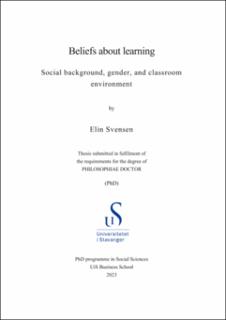Beliefs about learning : Social background, gender, and classroom environment
Doctoral thesis
Permanent lenke
https://hdl.handle.net/11250/3100955Utgivelsesdato
2023Metadata
Vis full innførselSamlinger
Originalversjon
Beliefs about learning : Social background, gender, and classroom environment by Elin Svensen, Stavanger : University of Stavanger, 2023 (PhD thesis UiS, no. 727)Sammendrag
Background: Increasing students’ learning and their completion of high school has been a policy challenge for many years. This thesis investigates how the psychological mechanism of growth mindset is related to educational outcomes in the Norwegian school context. The theoretical starting point for mindset theory is the assumption that students’ beliefs about the nature of intelligence play a larger role for motivation than is generally acknowledged in the education sector.
Aims: The aim was to empirically investigate students’ beliefs about the nature of intelligence and how these beliefs are related to outcomes in high school as well as to societal factors already known to be related to inequality in learning outcomes. Specifically, the thesis investigates the relationship between academic mindset and socioeconomic background, gender, and experiences from middle school. Article One investigates how mindset is related to social background and grades in high school while Article Two investigates how it is related to gender and completion. In Article Three, my coauthor Maximiliaan W. P. Thijssen and I investigate how classroom effects on growth mindset in middle-school affect academic choices in high school.
Methodology: This thesis has a quantitative approach. All three studies are empirical investigations of a sample of about 10,000 students in public high schools in two counties in Norway. The data material derives from three sources. First, there are survey data from when the students entered the first year of high school in 2017. Second, the county administrations provided registry data on middle-school grades and results from high school. Third, Statistics Norway, a government agency, provided data on background characteristics such as parents’ education, income, and country of birth.
Results: Article One and Article Two demonstrate that boys and students whose parents have a low level of education express lower levels of growth mindset upon entry to high school than girls and students whose parents have a high level of education. However, these differences are for a large part related to the students’ grade-point average (GPA) from middle school. Nevertheless, the level of growth mindset predicts educational outcomes in high school even among similar performing students. In Article Three, my coauthor and I find within-middle-school variation in the classroom effects on growth mindset, and we also find that classroom effects on growth mindset predict academic choices ahead of and in high school.
Conclusion: One finding common to all three articles is the central role played by students’ expressed level of growth mindset as a distinct predictor of educational success in high school. Several theories propose that students’ beliefs about the nature of intelligence and ability are important for their educational behavior. The empirical investigations contribute to our understanding of the fundamental relationships between mindset and other factors known to be important for inequality in education. Specifically, it is an important mechanism for understanding prevailing differences in educational outcomes across social background and gender. The majority of the findings in the thesis are correlational, and further studies are needed to fully understand the causal mechanisms involved. However, the thesis provides evidence suggesting a relationship between mindset and how students take advantage of learning opportunities in high school.
Består av
Paper 1: Svensen, E. (2023) Mindset as a potential link between family background and high-school achievement. Acta Sociologica, 66(3), https://doi.org/10.1177/00016993221145427Paper 2: Svensen, E. Growth mindset, prior performance, and high school completion for boys and girls. [Under review]
Paper 3: Svensen, E. & Thijssen, M.W.P. Long-term classroom effects on academic choices [Unpublished]
Utgiver
University of Stavanger, NorwaySerie
PhD thesis UiS;;727

